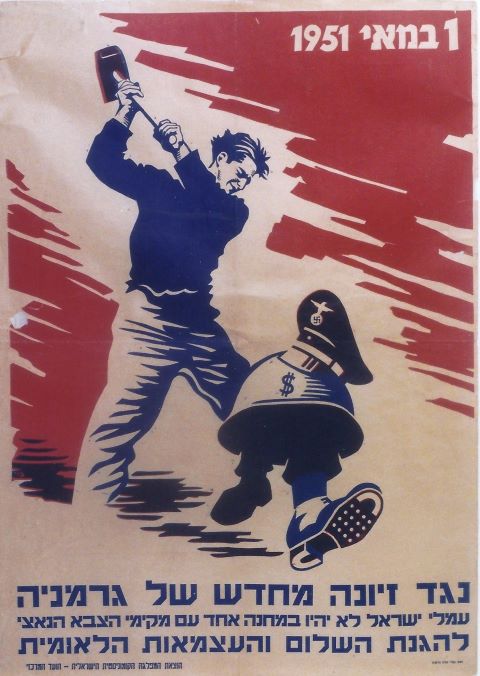Good luck Ha’avoda
- פרטים
- קטגוריה: מאמרים
- נוצר ב שלישי, 22 ינואר 2013 16:10
- מחבר\ת Ben Garratt
Israel goes to the polls today for its general election. At Labour Friends of Israel, we make the progressive case for Israel, drawing attention to the country’s vibrant democracy, civil society and economic sphere in all its varied guises. However, if there is one time in the political calendar in which I hope we will be forgiven for narrowing our focus, and being proudly biased, it is election time.
Israel faces a huge array of challenges, both externally and internally, and there is understandable disappointment over the failure of the Israeli and Palestinian political leaderships in recent years. However, whatever these elections produce, we on the left can be cautiously optimistic about our sister party’s prospects. That’s because, for the first time since 1992, the Labor party – Ha’avoda – is set to substantially increase its presence in Israel’s 120-seat parliament, from 13 seats in the 2009 election to, according to the latest polls, around 20 seats today. Led by Shelly Yachimovich, Labor is on course to become the second largest party in the parliament, where it will be joined on the left by Meretz, also a member of the Socialist International.
How has Labor improved its fortunes? By focusing on social justice, taking its exciting campaign to the people and by offering a list of popular new candidates, such as the venture capitalist Erel Margalit and social protest leader Itzik Shmuli, who are standing alongside the experienced Isaac Herzog and Nachman Shai – Nachman having recently ‘crossed the floor’ from the Kadima party, in a further sign of Labor’s rising fortunes.
Some have expressed concern over the candidates’ focus on the economy, rather than the Palestinians. However, I believe we have a responsibility to look a little deeper. While those of us campaigning for a two-state solution for two peoples are worried about the hardening positions of the Israeli right and the growing influence of the violent Hamas, Labor’s predicted success is a very positive development for our values. First, all those who have joined us on visits to Israel in recent years will know that the commitment of Labor’s candidates to renewed negotiations is undeniable – a policy backed by 69 per cent of the public, according to a recent poll. But, second, to understand the language of social justice being promoted by today’s Israeli left, we need to look more closely at the party’s revival.
Between the 2000 Camp David peace talks and 2011, our sister party was a rapidly declining force in Israeli politics. Not because of any rejection of a two-state solution by the Israeli public, but due to the Palestinians’ violent response to the then Labor leader Ehud Barak’s far-reaching offer. The suicide bombings of the second intifada smashed the leftwing dream that putting ones dovish cards on the table would bring peace, and Labor, now associated with naivety, not security, was punished at the polls.
So what has changed? In 2011, millions of Israelis realised that, whilst they had been voting right for security reasons, the right had used its power to concentrate wealth at the very top, and to ignore major political challenges looming on the political horizon. Although Israel weathered the global financial storm remarkably well, the hardworking middle classes have been squeezed – even those working in Israel’s famously innovative hi-tech sector. For example, the price of food in Israel is higher than in the UK, and yet the median annual salary is nearly half that of this country’s.
With uproar over the rising price of Tel Aviv apartments and cottage cheese, the Israeli public took to the streets to demand economic as well as physical security, and to call for a united country based on shared rewards and responsibilities. Tent cities were established by activists across the country and, on 3 September 2011, nearly half a million people – over six per cent of the entire population – marched for change. Shelly Yachimovich, former journalist and political talkshow host, was elected as Labor’s new leader a few days later.
Under Yachimovich, the party has put its economic plan front and centre: calling for increased social welfare, lower executive pay, and huge investment in social housing – all the time proudly asserting: ‘It can be so much better here!’ But what many commentators have missed is that Labor’s call for social justice is about more than economics. It is a genuine attempt to reach out to those who share its – our – core values of fairness, freedom, community and democracy.
If the peace process is going to take centre stage in Israel once more, it will be due to this commitment to values: to the safeguarding and advancement of Israel as a Jewish and democratic state, and support for a two-state solution for two peoples. As Hilik Bar, the party’s charismatic secretary-general and election candidate said last week: ‘If you are in favour of strengthening civil liberties and a truly democratic Jewish state, the Labor party headed by Shelly Yachimovich is your best bet.’
Good luck Ha’avoda!
———————————————————————————————————————————————————————————————————————————————————————
Ben Garratt is deputy director of Labour Friends of Israel. He tweets @Ben_Garratt / Article origilny published on www.progressonline.org.uk.


